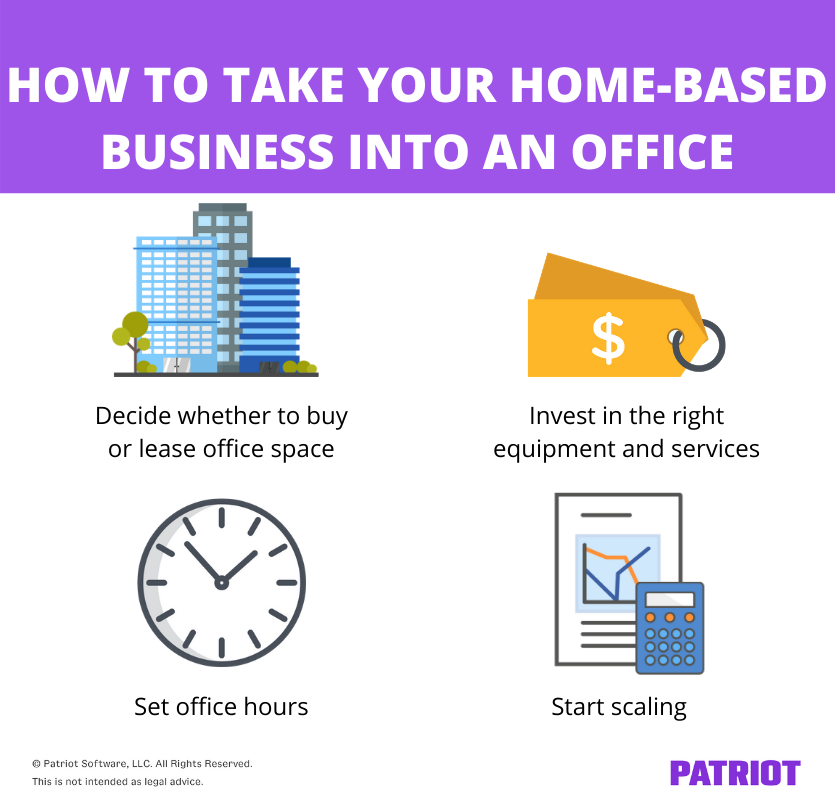For many, operating a business from home is a convenient and enjoyable way to make a living. No wonder there are nearly 15 million home businesses in the U.S. alone—that’s half of all businesses in the country.
The goal of many business owners, however, is growth, and at some point you’re bound to get tired of taking meetings where you eat dinner at night, or the logistics of separating business and personal documents. Eventually, you might want to transition into a real office. And the more people you hire, the more of a necessity this becomes.
When that time arrives, you should be prepared to answer a few questions and make a few key investments. This guide can help you manage the transition.

Should you buy or lease office space?
Deciding to buy or lease office space depends on where your business stands financially—but there are pros and cons to both. You may even want to consider shared office space, like WeWork or Spaces, if you’d like to feel like you’re at a larger company or share in the benefits of hot pots of coffee and replenished printer supplies. But, shared office space comes with restricted autonomy, so if you want your own business front, consider some pros and cons of buying and leasing.
Pros of Buying
- Fixed costs
- Greater tax deductions via mortgage interest, property taxes, etc.
- Appreciating commercial value
- Additional income via renting extra space
Cons of Buying
- Inflexibility to move if your business takes off
- Significant upfront costs to make the space your own
Pros of Leasing
- Better chance of renting in a great location
- More financial flexibility to respond to opportunities in the market
- No need to worry about maintenance and other property concerns
Cons of Leasing
- Risk of annual rent increases and increased costs
- No equity
So, what makes sense for you right now? Do you have enough available capital to make a major real estate investment? Will you soon? Is a good location essential to your business success? Take a look at your finances and the market to see what you can afford now, project what you might be able to afford in the future, and make an educated decision for your business.
Invest in the right equipment and services
Chances are, your home-based business has all the equipment and services you need to operate your business effectively. However, moving into a new space may require purchasing new equipment for that space and making smart investments in business utilities like internet and phone lines. You can’t use the same home internet service in your new office space, and you shouldn’t file all of your personal and business expenses together in the same filing system.
When you’re moving your business out of the house, think about everything you’ll need for your new office space.
Finances
Are your personal and business finances separate? Setting up a business bank account is the first step to avoid mixing personal expenses with your business expenses, and it can help you avoid confusion at tax time. In fact, don’t wait to do this—it should be one of the first steps you take as a new business owner.
But, likewise, bringing all of your business-related financial documents into your new office is a smart idea. That way, you can literally segment your personal and professional finances rather than just keep everything separate in your head.
Utilities
At home, your personal cell phone was likely fine for handling your business needs. However, one of the primary reasons you’re setting up an office is to separate your personal and business resources. Customers should not be calling the same number that your kids call to get a ride home from school.
A business phone line demonstrates that you mean business, and helps you maintain work-life balance. Plus, if you bring on new staff members, you’re not going to give them your personal phone to handle inbound calls, right?
Some commercial leases may include utilities like phone and internet, but it’s also entirely possible you’ll have to work these plans out yourself. Make sure you know what is and isn’t included in your lease, and take some time to see what plans are available in your area. Shopping for utility plans before you sign the lease will help ensure you don’t miss any business days.
Workspace
You know what you like in a workspace and how you’re most productive. Your office workspace should facilitate work. Invest in a good desk with enough space to see everything you need. Get a comfortable chair that provides back support, an efficient computer, and any specialized equipment you need to run your business. Purchase a comfortable chair for customers to sit. Buy a plant or two.
If you love the workspace you have at home, bring it into your office, but be ready to refill that home office space, too.
Set office hours
Office hours are crucial for your customers, but they’re also important to you and your staff. Maintaining a positive work-life balance after you transition into an office is essential for your mental health.
The flexibility you once enjoyed when you got out of bed and walked to your desk isn’t gone, but it’s a little less tractable. When you’re in an office, you have to account for commuting time and the availability of your customers and your staff. Keeping standard office hours tells your customers when you’ll be available in the office but it also sets clear expectations for you and your employees.
Establishing office hours can help you minimize distractions, prevent unscheduled drop-ins, and organize your business more effectively.
Start scaling
There are two immediate benefits of moving into an office: space and clout.
Think about it, aren’t you more impressed by a business when it has a real office space or storefront? There’s something psychological to having an office, sure, but it’s also practical. Potential customers may be more comfortable (and impressed) in a professional meeting space. New employees will prefer an office environment to your home.
When you have that office space, you should update your website and ramp up your marketing efforts to encourage people to contact the office or schedule a visit. There are many tools to help you build up your web presence and grow your business by raising awareness of your office space.
And, speaking of space, that new office will make it easier to incorporate new staff members. You may not be ready to bring on new employees on day one in your new office space but, as your business grows, having an office to host employees (rather than your home) may be a significant boon to additional growth. If you have immediate hiring needs, an office can facilitate them. On the other hand, if you’re content to have a remote workforce, it may be worth asking yourself if an office will be a benefit to your growth.
The bottom line
When the time comes to consider moving your home-based business into an office, you shouldn’t just do it on a whim. Take the time to think about what you want from a new office, what you’ll need to set up your new space, and how your operations will change. Moving into an office may afford your business more opportunity to scale, but only if you’ve taken the proper steps to get there.
These views are made solely by the author.

